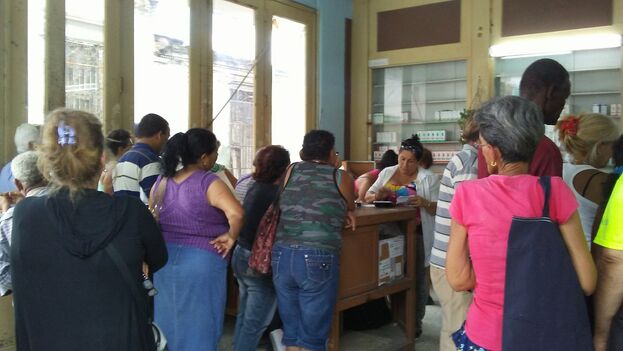
![]() 14ymedio, Jorge A. Gómez and Mario J. Pentón, Cienfuegos / Miami , 17 May 2019 — Juan Manes Suárez, a specialist at the Provincial Gastronomy Company, told workers that, starting next Monday, catfish paste would be used in the production of processed ham, sausage and chorizo due to “the shortage of animals available for slaughter and retail sale.”
14ymedio, Jorge A. Gómez and Mario J. Pentón, Cienfuegos / Miami , 17 May 2019 — Juan Manes Suárez, a specialist at the Provincial Gastronomy Company, told workers that, starting next Monday, catfish paste would be used in the production of processed ham, sausage and chorizo due to “the shortage of animals available for slaughter and retail sale.”
He added that the croquettes and hamburgers produced for the retail market would be made with rice flour or sweet potatoes due to a shortage of wheat flour, which he attributed to “the economic problems the country is experiencing.”
Just a day earlier, the minister of internal trade, Betsy Díaz Velázquez, had stated on Twitter that producing alternative foods would be given high-priority in order to address retail supply shortages, though she offered no further details in response to skepticism expressed by Twitter followers who challenged her.
On the Cuban television show Round Table Díaz Velázquez blamed the shortages on the United States, which recently decided to enforce Titles III and IV of the Helms-Burton Act for the first time. She claimed that the current situation is temporary and that the decision to increase rationing is “supported by the people.”
“Everyone has to wait in line,” says Yaquelin Contreras, a 26-year-old Cienfuegos resident. “Things just get worse and worse. We are the country of lines. I spent two hours outside the Mercado Habana waiting to buy chicken. Just as I got to the front door, they ran out. Later, the same thing happened when I went to buy cooking oil at Casa Mimbre.”
Contreras also regrets the austerity measures, especially since customers are already burdened by poor conditions at retail establishments.
“All the stores and workplaces have banned air conditioning to save money,” she says. “They put fifty or a hundred people in a hermetically sealed office to process paperwork. The heat is unbearable. It’s unsanitary and people who work there are always in a bad mood.”

Iris Hourruitiner, a retiree living in the Buena Vista neighborhood, believes she is seeing a return to the days of the “Special Period.”
“On television they are constantly saying that everything will be all right. I remember that’s what they said in the 1990s. I still have some recipes from those days for beefsteak made from grapefruit rinds. Thank God I learned to make sugar cane liquor from green tomatoes. I am well-prepared for this second Special Period,” she jokes.
Hourruitiner, a fervent Catholic, regrets that the government does not allow charitable organizations such as Caritas to have a greater presence on the island. “People have been going hungry in Cuba for the last sixty years. The government knows this but doesn’t want to solve the problem. If they were allowed, there are institutions that could provide food. If [the government] really cared about people’s suffering, it ought to let other dispassionate parties help.”
Shortages also extend to other sectors of the market such as pharmaceuticals. Enalapril, Atenolol, hydrochlorothiazide, Dipironas, and metformin have been unavailable for approximately four months. Discussions among patients in line at pharmacies to obtain these drugs have led authorities to intervene in order to bring some order to the long lines.
Cuba is experiencing severe rationing of food and other essential products. Failure to pay what it owes to its main suppliers (now totalling 1.5 billion dollars), the debacle of the Maduro regime (its principal benefactor and ally), and the increase in sanctions by the United States have backed the island’s fragile economy into a corner.
Among the newly rationed products are chicken, eggs, rice, beans, soap and tooth paste. Even in hard currency stores customers are limited in the number of products they may buy, which has led to long lines throughout the island.
_________________
The 14ymedio team is committed to serious journalism that reflects the reality of deep Cuba. Thank you for joining us on this long road. We invite you to continue supporting us, but this time by becoming a member of 14ymedio. Together we can continue to transform journalism in Cuba.
